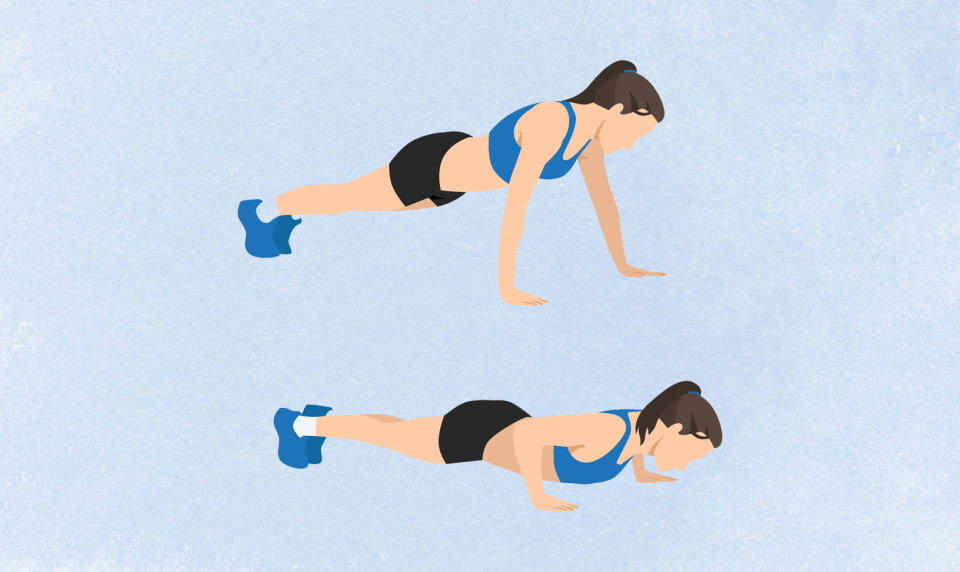I did 50 resistance band push-ups every day for a week — here’s what happened to my body

You either love or hate push-ups, in my opinion. I’m yet to meet someone indifferent to them, but one push-up variation that garners a lot more hate than love is the resistance band push-up. Self-confessed fitness sadist that I am, I did 50 reps a day for one week.
I keep one of the best resistance bands on standby for impromptu home workouts when I can’t get to my favorite CrossFit classes, so it felt like the perfect opportunity to add the exercise into my upper body routine for a week.
Before we get into it, it’s worth mentioning that 50 reps a day long-term wouldn’t be the best way to build upper body strength or muscle. Your weekly routine should be varied, progressively overload the body, target multiple muscle groups and include active recovery and rest days, providing your muscles the chance to repair and build.
But for a week-long challenge only, I was ready to get going.
How to do resistance band push-ups

First, choose a band that allows you to perform a push-up with full range of motion — you won’t get much out of the experience if you can only lower your chest a quarter way to the ground. Then, choose rep ranges and sets that suit your ability level.
If preferred, start from your knees. I recommend warming up with a few rounds of standard push-ups and upper-body mobility exercises to prep the shoulders, triceps and pecs for the added resistance, sending oxygen and blood flow to the muscles.
Wrap the resistance band around your midback, aligning with your shoulder blades or bra strap
Loop your hands through either end of the band, then move into your starting push-up position with your shoulders stacked over your wrists and the ends of the band secured beneath your hands
Align your hips with your shoulders
Gently brace your stomach to engage your core
Bend your elbows and lower your chest to the ground, ensuring your hips don’t sag or shoot upward
Pause at the bottom of the push-up, press the ground away, lift your chest and extend your arms, back to the starting position
After making sure I had the technique fresh in my memory, it was time to get started on my week-long challenge. So, I grabbed my bands and assumed the plank position. Here's what I learned.
I did 50 resistance band push-ups every day for a week — here’s what happened to my body
Here's what I learned.
It's not for beginners
I wouldn’t recommend these to anyone venturing into entry-level push-ups. There are steps to take first, and other push-up variations that can help build foundational upper body strength. I advise managing 3-4 sets of 8-10 reps unbroken with solid form before adding external resistance.
If you’re thinking of giving them a try, band positioning matters. I like to hook a looped band around my midback with the entire band sitting above both elbows, secured with my hands.
To make it slightly easier, you could allow your elbows to poke through the loop so that one part of the band sits above the elbows and the other just below, decreasing overall resistance. Either way, this one isn’t for beginners.
It’s a seriously tough bodyweight upper body exercise
I enjoy bodyweight training because it builds relative strength. People with high relative strength levels are strong compared with their body size; think gymnasts and anyone who enjoys calisthenics training.
I chose a band that allowed me to lower my chest to the floor, adopting a full range of motion and working my muscles hard, particularly my weaker triceps. The familiar shaky feeling kicked in pretty fast, and I had to focus on bracing my core to prevent my hips from dropping or arching my back — think a straight, tight torso that moves as a unit.
Whether it’s yoga, Pilates, or strength training, exercises that improve mind-muscle connection are crucial to any training regime, and one way to practice this is to focus on the working muscle groups and how you contract them as you move.
Adopting 5 sets of 10 reps, I gave myself 30 to 60 seconds of recovery between sets, performing each set in the mirror to check my form and focusing on squeezing my chest, shoulders and arms every rep. No matter how many reps you do, this is one tough push-up exercise.
I used my knees
I wanted to avoid reaching failure too early, as once those muscles have reached full fatigue, good luck finishing off the reps. Unlike the quads, glutes, or lats which are large, powerful, and more fatigue-resistant muscle groups, smaller ones like the anterior deltoids and triceps, tire faster.
50 reps felt about right to give me enough juice to finish while feeling like I’d reached my personal limit. That meant using my knees for some reps and sets. It’s important to find balance, though. If you find regular push-ups doable, starting on your knees for resistance band push-ups will help improve your technique.
However, if you’re still using your knees for standard push-ups, I’d prioritize building enough strength to perform full range of motion push-ups before adding a band.
Another way to approach this is to perform a push-up without using your knees, lower your body toward the ground, and then pop your knees down for the pushing-up phase of the movement.
My verdict on 50 resistance band push-ups every day for a week
A week later, my upper body strength hasn’t remarkably improved but my technique has. I haven’t sculpted a ton of muscle definition worthy of a bodybuilding comp, but my muscles feel hard-worked like they’ve put in a shift — and they have.
To do this challenge, I maintained my regular hot yoga routine and CrossFit classes, reducing the load for upper body exercises or switching some for lower body or core work where it felt necessary. That said, I hadn't anticipated the return of the Memorial Day Murph challenge soon after (ouch).
Even adding light resistance to push-ups emphasizes the triceps and forces you to work that much harder on maintaining form — it’s the first to go when the body gets tired or overwhelmed. This challenge certainly taught me to appreciate humble push-ups more.
